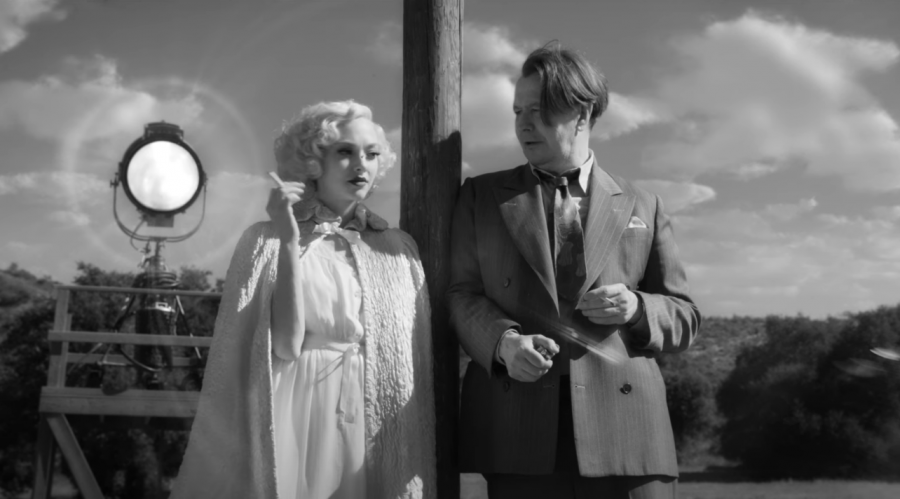A thrill for movie nerds, a cascade of meta-narratives and an explosion of old-timey cinematic devices, “Mank” rewards patient viewers with an experience unlike any other in director David Fincher’s filmography.
“Mank,” Fincher’s first film since 2014’s “Gone Girl” is an adaptation of a script by the director’s late father, Jack Fincher. The late Fincher based the screenplay on a false assertion from film critic Pauline Kael’s since-debunked 1971 essay “Raising Kane,” which alleges Orson Welles didn’t write a word of the “Citizen Kane” screenplay. Welles and co-writer Herman “Mank” Mankiewicz won the film’s only Oscars for its script.
Starring Gary Oldman as the film’s eponymous self-destructive alcoholic screenwriter Mank, Fincher’s newest follows the torrid writing of “Citizen Kane” along with a barrage of flashbacks detailing his rocky relationship with Hollywood.
Amanda Seyfried plays actress Marion Davies in a role that’s sure to garner her first Academy Award nomination. Davies is brought into the story via her relationship with newspaper magnate William Randolph Hearst, the man on whom the fictional “Citizen” Charles Foster Kane is primarily based. Seyfried is magnetic in her portrayal of the former starlet.
The world of “Mank” is unsurprisingly like the world of “Kane”: it’s a world of bastards, an intricate web of towering personalities where razor-sharp dialogue is thrown about at a breakneck pace. It’s candy for Old Hollywood enthusiasts and a reminder that some things never go out of style.
Because “Mank” centers Hollywood and one of the city’s greatest productions, some have accused the film of being “Oscar-bait,” or a clumsy attempt to garner awards and attention. This is an unfortunate mischaracterization; the film was a passion project for Fincher, and while it may use some of the same devices as Best Picture winner “The Artist” and near-winner “La La Land,” there’s a deliberation to “Mank” that only Fincher films possess.
The way the camera moves with the actors, the way every inch of the screen is utilized, the sheer scale of the production and art design: it’s all distinctly David Fincher.
To immerse the viewer in the 1930s to 1940s mood, “Mank” was filmed in black-and-white, mixed in mono instead of stereo and features an old-school score from Trent Reznor and Atticus Ross, whose film score work is likely more known now than their work in Nine Inch Nails, the industrial music group Reznor was the sole member of until Ross officially joined in 2016.
The visuals are similarly immersive, featuring heavy film grain, vintage title design, massive widescreen cinematography and even artificial blemishes like cue marks, the black circles that appear on screen to tell the projectionist to switch reels.
The film’s discussion of contemporary news, like socialist author Upton Sinclair’s unsuccessful run for governor and the rise of Hitler’s Nazi Germany, gives the film weight and complexity, as well as a brief but compelling cameo from Bill Nye as Sinclair.
Speaking of performances, scene-stealers fill the corridors of “Mank”: Arliss Howard and Charles Dance are perfect as the menacing Louis B. Mayer and William Randolph Hearst; Lily Collins and Tom Pelphrey bring warmth to the film as Rita Alexander and Joseph L. Mankiewicz; and Tom Burke is a brilliant Orson Welles. Burke’s immense performance can even be felt in scenes where Welles is absent.
At one point, Mank says, “You cannot capture a man’s entire life in two hours. All you can hope is to leave the impression of one.”
He’s right, as even “Citizen Kane” itself can hardly live up to its own reputation. But the story of “Citizen Kane” is not only about Charles Foster Kane. It is also the story of William Randolph Hearst, the man who had it all yet never was satisfied; of Orson Welles, the young hotshot who never made another film so beloved; and of Herman J. Mankiewicz, the celebrated writer who never got the credit he thought he deserved.
“Mank,” as an extension of “Citizen Kane,” has etched itself into film history merely by existing. While there’s only one “Kane,” there’s also only one “Mank,” and Fincher may come out of this awards season with more Oscars than Mank himself.





